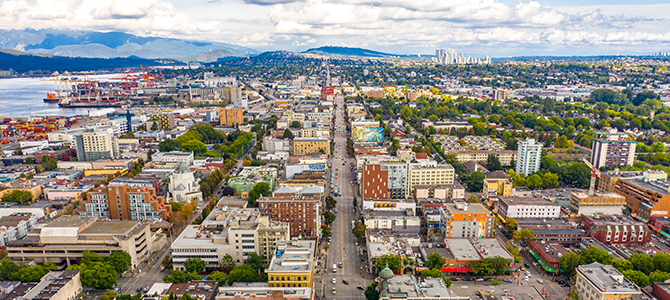
 City seeking input on actions to increase housing options and accelerate SRO replacement in the Downtown Eastside
City seeking input on actions to increase housing options and accelerate SRO replacement in the Downtown Eastside
The City of Vancouver is proposing policy changes to increase housing options in the Downtown Eastside (DTES), including for those living in Single Room Occupancy buildings (SROs). We are currently seeking input from residents and other interest holders to help inform recommendations to City Council later this year.
The proposed changes follow City Council direction to explore policy updates that would make it easier and more affordable for governments, non-profits and the private sector to build low-income housing and replace aging SROs. Proposed changes align with the vision outlined in the 2014 DTES Plan PDF file (144 KB) of providing diverse housing options, fostering a mixed-income community and enhancing the quality of life for low-income residents.
Proposed changes
The current definition of social housing in the DTES and existing inclusionary housing policy, which sets out the required mix of social and market rental housing in the Downtown Eastside-Oppenheimer District (DEOD), compounded by high construction costs and current market conditions, have proven to be a significant barrier to the construction of social housing.
The proposed changes are intended to address the housing crisis and enable the creation of affordable housing in the DTES, taking into consideration the financial realities of building new units:
- Updating the policy for inclusionary social housing developments in the DEOD from 60% social housing and 40% secured market rental to 80% secured market rental housing and 20% social housing.
- Allowing private developers to deliver below-market rental housing with 10% of units at deeply discounted rents to replace SROs, along with strong tenant protections.
- Increasing the allowable height and density in some areas, up to 32 storeys, to support SRO replacement, private below-market rental housing and inclusionary social housing developments.
- Aligning the definition of social housing with government funding programs by adjusting the requirement from a minimum of 33% of units at the shelter rate of income assistance to a minimum of 30% of units at or below Housing Income Limits with at least 20% of units at the shelter rate of income assistance.
- Streamlining development processes for heritage buildings while preserving important architectural features.
While proposed changes would reduce the number of shelter rate housing and social housing units required for individual projects, they would improve the financial viability of these projects, leading to more overall social housing being built. The proposed changes also align with the DTES Plan's goals to replace private SROs with self-contained social housing and offer a range of housing options for various income levels, including market rental, as well as Council’s recent direction to prioritize SRO replacement.
In addition, these changes complement the City’s broader Social Housing Initiative and Below Market Rental Policy, which increase the availability of affordable housing citywide. More housing options for lower-income residents, including those in the DTES, will contribute to a more equitable housing system both within the DTES and across Vancouver.
Changes to three public views
The City is also proposing moderate changes to three public views, which would enable up to 32 storeys in some areas of the DEOD. This would enable affordable rental homes while preserving landmark views. Proposed changes could slightly impact the current views from three vantage points: Queen Elizabeth Park, the Olympic Plaza Stage and Creekside Park.
Protecting low-income residents with stronger tenant protections
The City is committed to protecting low-income residents and prioritizing their well-being. To address concerns about displacement, the City’s Tenant Relocation and Protection Policy would help ensure that those affected by redevelopment have the opportunity to either stay in the DTES in new, modern buildings or transition to other affordable housing options across the city. Proposed changes include:
- Offering tenants the right to return to the new building at their existing rent, or at a 50% discount from the city’s average market rents, whichever is lower.
- Requiring landlords pay for all moving expenses rather than the current flat rate.
While the City continues to advocate for continued investment from senior governments to support affordable housing initiatives, proposed changes aim to address current funding and development challenges, remove barriers and accelerate the development of affordable housing and the replacement of SROs.
Share your thoughts
From now until May 16th, we invite residents, businesses, and organizations to share their thoughts on the proposed changes through the online survey and by attending one of the public events. Your input will help inform a recommendation that will be presented to Council later this year.
For more information, to provide your feedback, and to sign up for updates, please visit the shapeyourcity.ca/dtes-housing